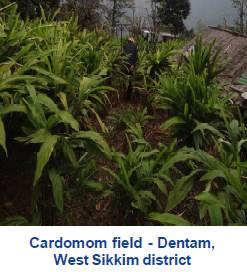|
Sikkim Goes Organic O ne of the most biologically diverse mountain states in India, Sikkim is the first to be declared as India’s fully organic state. This milestone initiative was proposed in 2003. The Chief Minister had declared that 75,000 hectares of cultivable land in the state would see a gradual but complete ban of pesticides and other chemical based agricultural inputs by 2015. The government set goals to develop basic infrastructure, an integrated package of organic technologies and markets for such products using strategic advertising. The conversion and certification have been done in accordance with the rules and guidelines given by the National Programme for Organic Production.For legal monitoring, the Sikkim State Organic Board was constituted to develop state organic standards, list out allowed synthetic and prohibited non-synthetic substances and establish an organic certification programme. In May 2003, the state government withdrew its subsidy on fertilisers. From 2006-07 onwards, transport and handling subsidy and commission to retailers was also withdrawn. The change in the government policy left the farmers with no alternative but to practice organic farming. The shift has proven to be economically sustainable.
The average Indian farmer is perpetually at risk, struggling to make
ends meet and arrange finances for procuring seeds, preparing the land,
maintaining the crop (buying fertilisers, pesticides etc) and the
livestock. The shift to organic cultivation removes the need to spend on
chemicals, without which farming can still be a profitable business.
Further, the organic certification helps farmers earn fair prices for
their produce in the market.
To provide technological support to the farmers, the state of Sikkim has taken up the initiative of producing local organic seeds and performing soil health assessment tests. From 2003-09, more than 46,993 soil samples were analysed and more than 46,000 soil health cards were issued. With multiple financial, technical and institutional support initiatives, the government also aims at better management of agricultural residue and livestock waste that could be put to use as natural fertilisers in the fields. In addition, the farmers have been trained in subsidiary activities like mushroom cultivation, apiculture, greenhouse development and floriculture, to complement income and build capacities. The success of the plan is a result of regular expert-farmer meetings and technical workshops. A major part of the state’s population is engaged in agricultural and tourism activities. Consequently, going organic is a lucrative way of boosting the state’s tourism capital. The increasing concern about ethically and naturally grown food adds to the numerous other advantages of organic farming. Ecologically, the indispensable advantage of the organic approach to farming is prevention of bio magnification in the food chain, reduced chemical contamination of land and water resources in the vicinity, reduction in leachate pollution of groundwater and maintenance of soil humus content. The benefits of organic farming and organic food are already being used as a successful marketing tactic by hotels where they allow the guests to pluck their own produce from the kitchen gardens followed with a quick cook and serve. Clearly, the state sees a great business opportunity in the initiative. Despite many efforts, the rough mountain terrain still poses difficulty in implementation since each farmer needs advice and know-how specific to his field and produce. Also, poor road networks and the perishable nature of farm produce are concerns for the authorities. In order to address food security issues with organic farming, there is an immense need to scale up production with technological aid since the state has shown a 30% decline in food grain production in the last two decades and is highly dependent on supplies from other states to meet its demands. To create an enabling environment for organic farming in other states, there needs to be provision for technical and financial help to farmers. The states also need to improve the certification procedure for organic products, which currently is complex and unaffordable for small farmers. The long term benefits of organic farming are invaluable - subsistence of agriculture, enhanced soil health, bio-diversity conservation and environmental protection are just some of them. Organic farming is definitely an example for the rest of the states to follow. q Kavya Arora References • http://articles.economictimes.indiatimes .com/2016-01-14/news/69765559_1_chemical-fertilisers-agricultural-land-farming• http://www.sikkimorganicmission.gov.in• http://www.dailyo.in/lifestyle/going-organic-field-notes-from-sikkim-farming-namchi-perbing/story/1/1974.html• http://www.business-standard.com/article/b2b-connect/organic-farming-a-boon-or-a-bane-115082800513_1.html |
